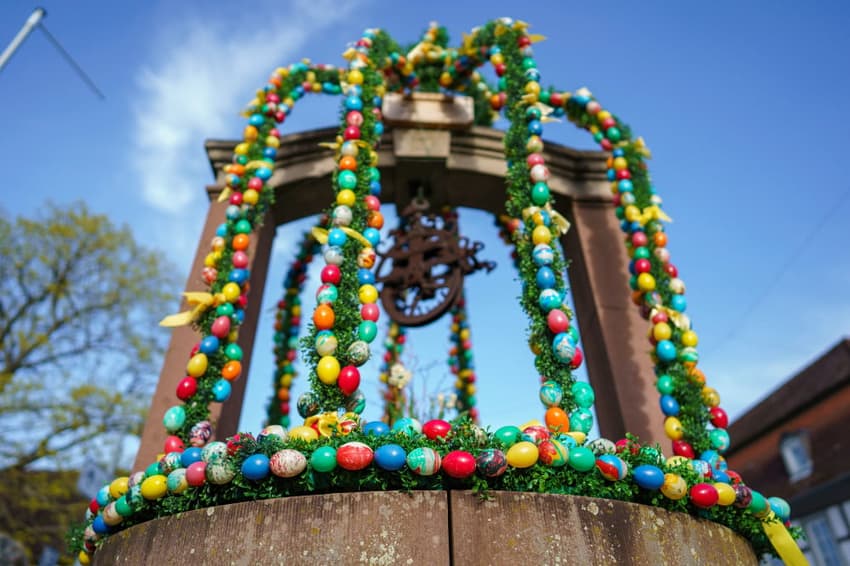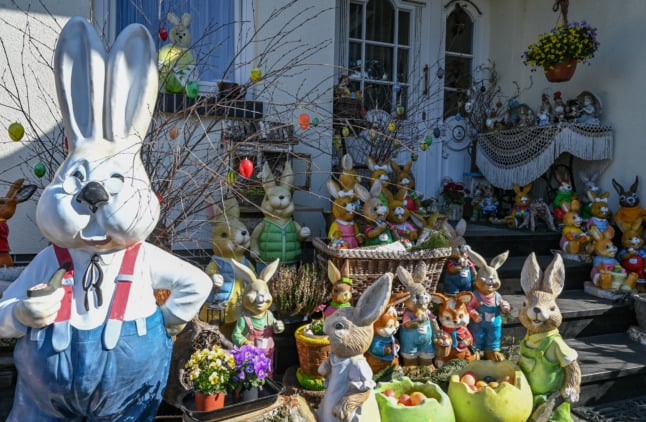What exactly is Germany's 'Green Thursday' and is it a public holiday?

Thursday March 28th, 2024 marks 'Gründonnerstag' in Germany. How exactly did the day get its name, and is it a bank holiday?
The Thursday before the Easter weekend is “Holy Thursday” in English. In German, however, you call it Gründonnerstag, which means “Green Thursday.” And now we are just as confused as you are.
READ ALSO: What's open and closed in Germany over the Easter weekend?
So how did the day receive its name?
Let’s have a look at this mysterious word. First of all, we have to keep in mind that Gründonnerstag isn’t the only word for this day – it’s just the most common one. Other words are Hoher Donnertag (“High Thursday”), heiliger Donnerstag (“Holy Thursday”) or even weißer Donnerstag (“White Thursday.”) But since Gründonnerstag is the most common word, let’s focus on that one.
Gründonnerstag is the day the churches remember The Last Supper, the last time Jesus got together with his twelve apostles to dine. Why exactly this day is carrying the colour green isn’t clear, but several theses exist to explain it.
The first and most probably most common thesis is the meaning of Grüne (“Greens”) as sinful people. After the fasting period in the week prior to Easter, these sinners made public were allowed to return to the church community as people without sin.
A second thesis is hidden in here – Gründonnerstag could also derive from the notion of grîn donerstac, where grînen is an Old High German word for crying. Hence, this thesis means that the sinners cry on this day to show the regrets they have.
Could it actually have to do something with the colour green?
Another thesis also links to greens, but in the more known way – as vegetables. Since probably the 14th century, it was tradition to especially eat green vegetables on Gründonnerstag.
Those include for example kale, salad and young sprouts, which are found everywhere in spring. The reasons for this diet are that it combines the requirements for fasting with the belief that spring vegetables get everyone’s energy going, so to say.
As you can see, the origin of Gründonnerstag is a tricky business. But at least it doesn’t mean that everyone has to dress in green.

Countless Easter bunny figurines in a Brandenburg garden. Photo: picture alliance/dpa/dpa-Zentralbild | Patrick Pleul
Is it a public holiday?
No, although many companies still give their employees a day off, as it's a popular travel day before the official four-day weekend. It's also a common practice for Kitas (daycare centres) to close their doors starting on Gründonnerstag, while school pupils generally have a full two weeks of Osterferien (Easter holidays) off.
Examples:
Der Gründonnerstag ist kein Feiertag in Deutschland.
The Holy Thursday isn’t a public holiday in Germany.
Am Gründonnerstag traf sich Jesus zum letzten Mal mit seinen Jüngern.
The Holy Thursday marks the day Jesus met his apostles for the last time.
Ich weiß nicht, warum es Gründonnerstag heißt.
I don’t know why it’s called “Gründonnerstag.”
Comments
See Also
The Thursday before the Easter weekend is “Holy Thursday” in English. In German, however, you call it Gründonnerstag, which means “Green Thursday.” And now we are just as confused as you are.
READ ALSO: What's open and closed in Germany over the Easter weekend?
So how did the day receive its name?
Let’s have a look at this mysterious word. First of all, we have to keep in mind that Gründonnerstag isn’t the only word for this day – it’s just the most common one. Other words are Hoher Donnertag (“High Thursday”), heiliger Donnerstag (“Holy Thursday”) or even weißer Donnerstag (“White Thursday.”) But since Gründonnerstag is the most common word, let’s focus on that one.
Gründonnerstag is the day the churches remember The Last Supper, the last time Jesus got together with his twelve apostles to dine. Why exactly this day is carrying the colour green isn’t clear, but several theses exist to explain it.
The first and most probably most common thesis is the meaning of Grüne (“Greens”) as sinful people. After the fasting period in the week prior to Easter, these sinners made public were allowed to return to the church community as people without sin.
A second thesis is hidden in here – Gründonnerstag could also derive from the notion of grîn donerstac, where grînen is an Old High German word for crying. Hence, this thesis means that the sinners cry on this day to show the regrets they have.
Could it actually have to do something with the colour green?
Another thesis also links to greens, but in the more known way – as vegetables. Since probably the 14th century, it was tradition to especially eat green vegetables on Gründonnerstag.
Those include for example kale, salad and young sprouts, which are found everywhere in spring. The reasons for this diet are that it combines the requirements for fasting with the belief that spring vegetables get everyone’s energy going, so to say.
As you can see, the origin of Gründonnerstag is a tricky business. But at least it doesn’t mean that everyone has to dress in green.

Is it a public holiday?
No, although many companies still give their employees a day off, as it's a popular travel day before the official four-day weekend. It's also a common practice for Kitas (daycare centres) to close their doors starting on Gründonnerstag, while school pupils generally have a full two weeks of Osterferien (Easter holidays) off.
Examples:
Der Gründonnerstag ist kein Feiertag in Deutschland.
The Holy Thursday isn’t a public holiday in Germany.
Am Gründonnerstag traf sich Jesus zum letzten Mal mit seinen Jüngern.
The Holy Thursday marks the day Jesus met his apostles for the last time.
Ich weiß nicht, warum es Gründonnerstag heißt.
I don’t know why it’s called “Gründonnerstag.”
Join the conversation in our comments section below. Share your own views and experience and if you have a question or suggestion for our journalists then email us at [email protected].
Please keep comments civil, constructive and on topic – and make sure to read our terms of use before getting involved.
Please log in here to leave a comment.